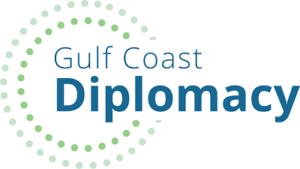In June, I started my internship with the Gulf Coast Citizens Diplomacy Council. My first few days were spent shadowing an International Visitor Leadership Program (IVLP) for Haiti which examined what conflict management in community organizations looks like in the United States, particularly in Pensacola, Florida. Instead of spending my day touring the office building and visiting Human Resources, I had the privilege of boarding the bus with two interpreters and four Haitian men who are recognized as leaders in their communities, traveling to meetings around the area learning how Haitian conflict management compares to the methods used in the United States. It wasn’t until this experience that I gained a true appreciation for how reciprocally beneficial participating in programs such as the IVLP can be, both for the visitors and for local community members.
We spent three days discussing strategies with organizations around Pensacola such as the University of West Florida’s Common Ground, a university group dedicated to promoting diversity and inclusion on campus, STRIDE, a community based mentorship program, and the Escambia Youth Justice Coalition, a group focusing on reducing the number of juvenile incarcerations. Each discussion led to new insights, new ideas, and new dialogue. Hearing from Haitians who are working to organize their own communities by facilitating change where they have recognized need and by implementing lasting strategies that prevent conflict was incredibly interesting and pushed each community member we met to think about the future of conflict in each country.
Although I do not speak French, I was not curtailed in my attempts to listen to and learn from the visitors who spent much of the day discussing how each meeting touched their hearts or inspired them to effect change in their communities back home. After one particular meeting in which the visitors discussed the Civil Rights movement in the United States with Reverend H.K. Matthews, a Civil Rights activist, one visitor shared a piece of insight with the group. He expressed sincere gratitude in saying, “You gave us a chance to be here today,” by recognizing the impact Rev. Matthews’s work in Pensacola and in surrounding areas had not only on the future of African-American lives but also on the future of citizen diplomacy in the United States. The critical mindset and unique perspective brought by the Haitian visitors to the experience ensured that the American participants learned just as much, if not more, from the discussions as the international visitors themselves.
A common theme throughout this week was the idea of progress. Who and how individuals get in the way of achieving progress, how to recognize a need for change in the name of progress, and the lessons Haiti and the United States can learn from each other in order to more effectively implement progress. After the participants worked with Serving the Hungry, a group working to feed the hungry in Pensacola twice a week from First United Methodist Church, the visitors brought up interesting observations. One Haitian said his perception of the United States had changed after he visited, from believing the United States to be a country with an endless supply of jobs and a lack of poverty, to one that is similar to Haiti, a country with similar problems.
We continued to discuss progress in the form of successes after our Wednesday meeting with STRIDE when one visitor said he had started to reevaluate what success means and how it can be different for different people, a concept he planned to bring back to his work with youth in Haiti. With the help of community partners, the Gulf Coast Citizens Diplomacy Council created platforms through which our visitors could think critically about conflict and the potential strategies for resolution.
One of the greatest lessons for me, personally, from this IVLP shadowing experience was best summarized by one Haitian participant. In one of our final meetings he put down his pen, looked into the face of the Americans, and said, “So we are the same,” to which the facilitator of the conversation, Katrina Ramos, a community activist, replied, “Absolutely.”
I would like to thank the Gulf Coast Citizens Diplomacy Council not only for the opportunity to spend a week learning from and engaging with people who are dedicated to their work and who are actively trying to use citizen diplomacy to resolve conflict but also for the privilege spending a summer dedicating myself to such valuable efforts.
Khaki Wade
